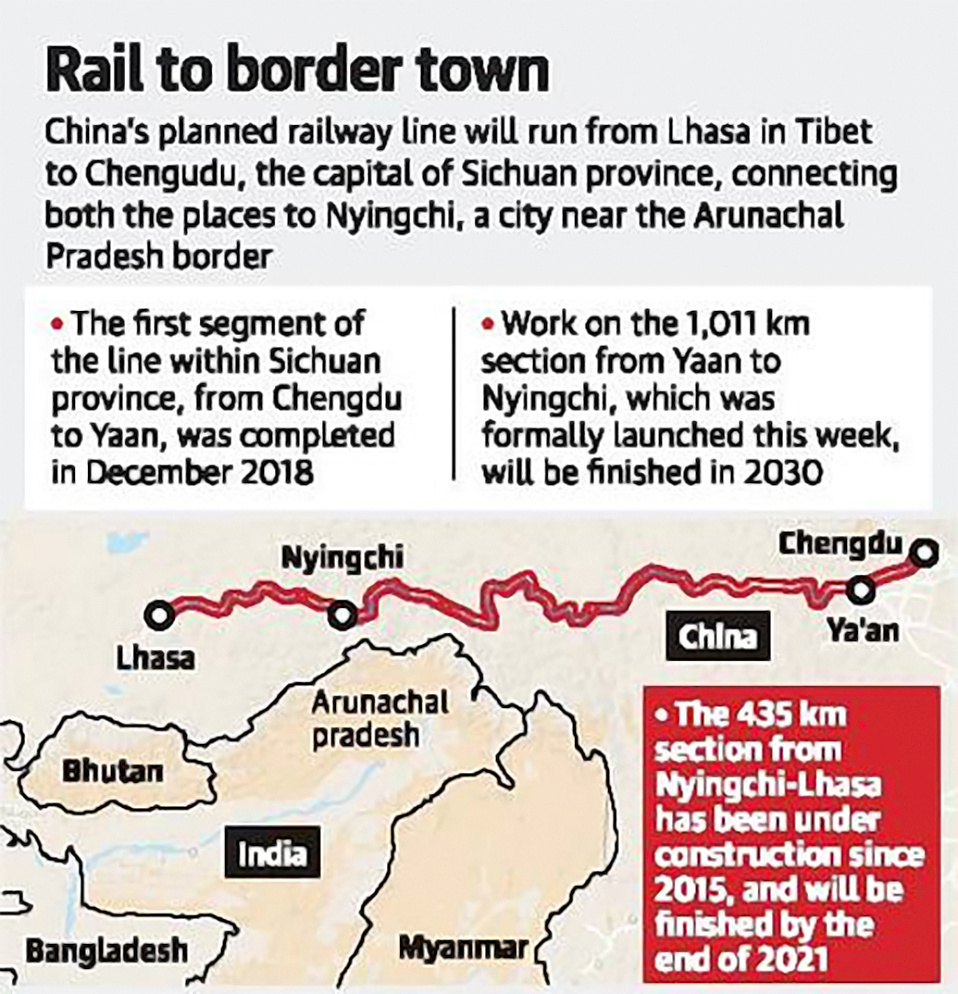China’s Railway Near Arunachal Border
Why in News
China has begun work on a strategically significant railway line that will link Sichuan province with Nyingchi in Tibet, which lies close to Arunachal Pradesh border.
Key Points
- This will be the second such route linking Tibet Autonomous Region (TAR) with mainland China.
- Earlier Qinghai-Tibet railway line connected Lhasa to the hinterland.
- Implications on India:
- Security Concerns:
- The railway line will largely improve the efficiency and convenience of military personnel and material transportation and logistical supplies in the border area.
- In situations of direct standoff near Arunachal Pradesh border, as was seen during Doklam or recent Ladakh standoff, China might be at an advantageous position.
- Doklam Issue: Indian troops intervened to block the path of Chinese soldiers engaged in building road-works on the Doklam plateau of Bhutan’s territory that Beijing laid claim.
- Ecological Concerns:
- The fragile ecological environment along the project line, may have ecological concerns for India.
- Security Concerns:
- Recent Steps Taken by India:
- India will spend 10% funds of the Border Area Development Programme (BADP) only to improve the infrastructure along the China border.
- The Border Roads Organisation (BRO) constructed the Daporijo bridge over Subansiri river in Arunachal Pradesh in a record span of just 27 days.
- It links roads leading upto the Line of Actual Control (LAC) between India and China.
- Recently the defence minister virtually laid the foundation of a tunnel at Nechiphu in West Kameng district of Arunachal Pradesh.
- It will shorten travel time for troops till the LAC through Tawang, which China claims to be its territory.
- The BRO is already constructing an all-weather tunnel under the Se La pass in Arunachal Pradesh which connects Tawang to the rest of Arunachal and Guwahati.
- The state government of Arunachal Pradesh has advocated selection of 10 census towns along the India-China border as pilot projects for infrastructure development in order to stop people living along its international borders, specifically with China, from migrating to faraway urban centres in the State.
- Recently, the Defence Minister inaugurated the Sisseri River Bridge located at lower Dibang Valley in Arunachal Pradesh connecting Dibang Valley and Siang.
- In 2019, the Indian Air Force inaugurated resurfaced runway at India’s easternmost Village-Vijaynagar (Changlang district) in Arunachal Pradesh.
- In 2019, the Indian Army conducted exercise ‘HimVijay’ in Arunachal Pradesh and Assam with its newly created Integrated Battle Groups (IBG).
- Bogibeel bridge, which is India’s longest road-rail bridge connecting Dibrugarh in Assam to Pasighat in Arunachal Pradesh was inaugurated in 2018.
- It will facilitate quicker movement of troops and equipment to areas near the India-China border.
Border Area Development Programme (BADP)
- The BADP was launched by the Ministry of Home Affairs in 1986-87 as part of a comprehensive approach to Border Management.
- BADP was initiated in the border areas of the western region during the Seventh Five Year Plan (1985-90), for ensuring balanced development of border areas through development of infrastructure and promotion of a sense of security among the border population.
- It is a centrally sponsored scheme. Funds are provided to the states as a non-lapsable special central assistance for the execution of projects relating to infrastructure, livelihood, education, health, agriculture and allied sectors.
- The States covered are Arunachal Pradesh, Assam, Bihar, Gujarat, Himachal Pradesh, Jammu & Kashmir, Manipur, Meghalaya, Mizoram, Nagaland, Punjab, Rajasthan, Sikkim, Tripura, Uttar Pradesh, Uttarakhand and West Bengal.
Sectors of India-China Border
- India and China share a boundary that stretches 3,488 km from Ladakh to Arunachal Pradesh.
- The border dispute still stands unresolved.
- It is divided into three sectors:
- Western Sector: It falls in the Union Territory (UT) of Ladakh and is 1597 km long.
- It witnesses the highest transgressions between the two sides.
- Middle Sector: It falls in Uttarakhand and Himachal Pradesh and is 545 km long.
- It is the least disputed sector between the two countries.
- Eastern Sector: It falls in the states of Sikkim and Arunachal Pradesh and is 1346 km long.
- China claims Arunachal Pradesh as part of south Tibet which is firmly rejected by India.
- Western Sector: It falls in the Union Territory (UT) of Ladakh and is 1597 km long.
Way Forward
- India needs to be vigilant enough for any new development in China near its border to protect its interests efficiently. Further, it needs to build robust Infrastructure in difficult border areas in its territory to ensure movement of personnel and other logistical supplies in an efficient manner.
